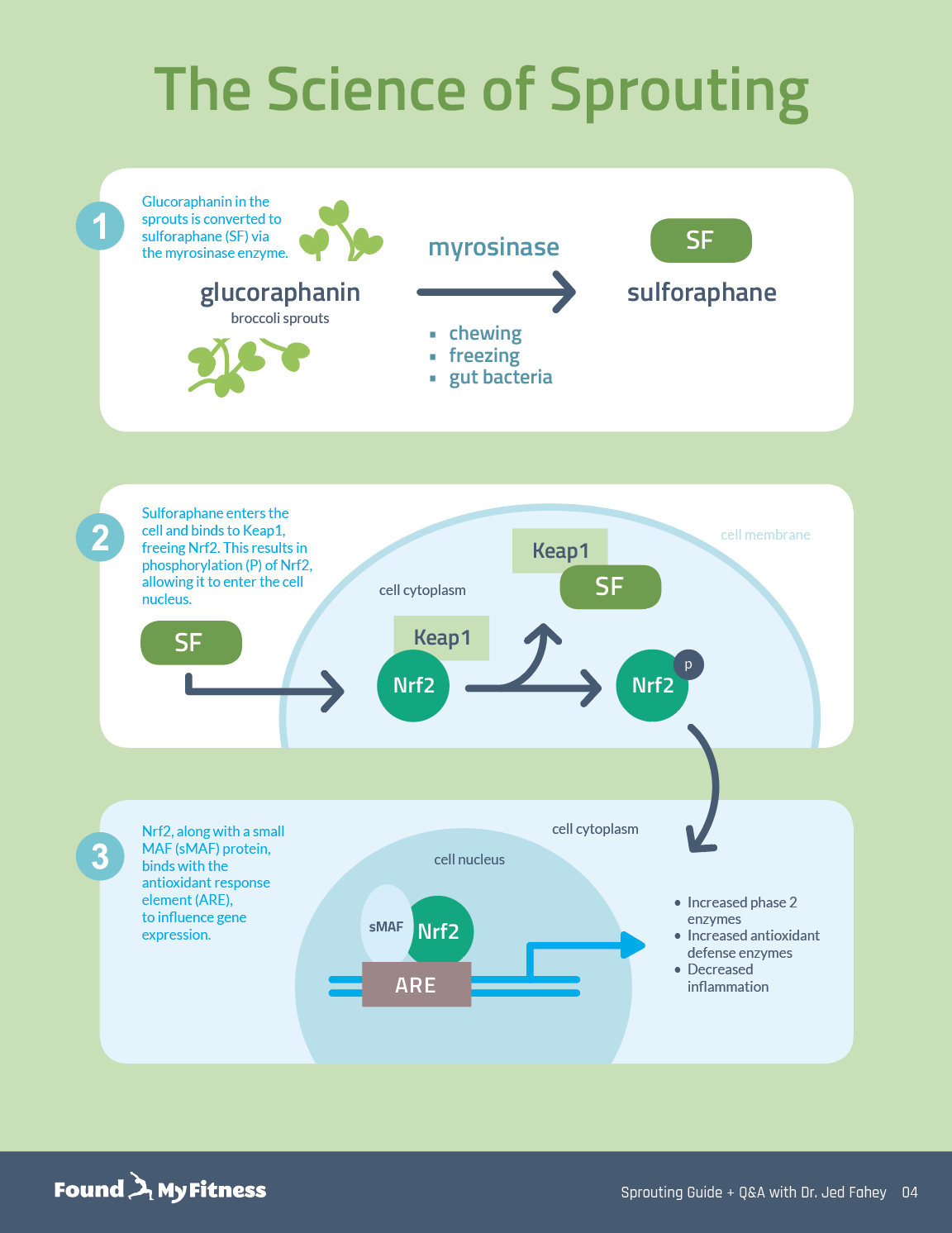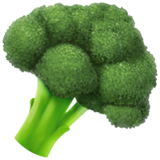Can you get sulforaphane by eating raw broccoli seeds? | Jed W. Fahey
Enter your email to get our 15-page guide to sprouting broccoli and learn about the science of chemoprotective compount sulforaphane.
Broccoli sprouts are concentrated sources of sulforaphane, a type of isothiocyanate. Damaging broccoli sprouts – when chewing, chopping, or freezing – triggers an enzymatic reaction in the tiny plants that produces sulforaphane.

Get the full length version of this episode as a podcast.
This episode will make a great companion for a long drive.
The abundance of glucoraphanin in broccoli seeds suggests that consuming the seeds (rather than sprouting them) provides a better means of obtaining the end product – sulforaphane. But broccoli seeds are rich in erucic acid, an omega-9 fatty acid that may be harmful to heart tissue and is classified as a natural toxicant. Interestingly, erucic acid is a component of Lorenzo's oil, an oil used to treat certain rare neurological disorders. Although prudence is warranted when consuming broccoli seeds directly, their bitter taste may provide a natural deterrent to copious consumption. In this clip, Dr. Jed Fahey discusses the pros and cons of sprouting and whether broccoli seeds contain erucic acid.
[Dr. Patrick]: So let's move on to the next section, the sprouting logistics. The question is, "Many people ask this question in one form or another. Can you clarify whether it's necessary to sprout broccoli seeds or if you can get sulforaphane by just blending and eating the seeds? You mentioned in the last episode with Dr. Fahey that you would try to try this. I'm curious why anyone would bother sprouting them if eating chopped up seeds works just as well."
[Dr. Fahey]: Yeah. It's a great question and I noticed that question echoed a lot in your...those that have been sent in by listeners. You know, it's correct, you could get...you would get the highest levels of glucoraphanin from just eating broccoli seeds. I think there's also a possibility of getting an overload of erucic acid, although, you know, people do supplement with omega-9 fatty acids, which is what erucic acid is. But there's certainly...we could have a whole...maybe we should have a whole discussion of erucic acid. So you would get a lot of that.
So broccoli seeds are about a third fat, or oils, and they're very rich in erucic acid. Secondly, they taste awful. Some may disagree, some people may be less sensitive to them. But if you just grind up broccoli seeds and eat them, they don't taste very good. And, in fact, when Paul Talalay and I did our first publication on broccoli sprouts, we very consciously...I mean we knew that it was broccoli seeds which had the very highest levels of glucoraphanin, and they declined as you sprouted those seeds, on a fresh weight basis. Until, you know, they plateaued for a couple of weeks very low, and then they started to climb again when the broccoli plant started to make flowers and seeds.
And we very consciously decided to try to promote broccoli sprouts. First of all, because we knew that nobody ate broccoli seeds, or sprouts at that time. And second of all, because broccoli sprouts were green and at least some people like the taste of sprouts and eat them regularly, not very many. But I don't know of any culture or group or reports of people that eat broccoli seeds regularly and I know there are no clinical trials on the use of them.
That said, the broccoli supplements, sulforaphane-rich or glucoraphanin-rich supplements, are generally made. I know that Brassica Protection Products makes theirs from seeds. But when you think about that, you boil seeds, you leave the fat fraction behind, and you just get the water-soluble glucoraphanin out, and then they dry it down in various ways and you have a very glucoraphanin-rich supplement doesn't have any fat in it.
So, I don't know, short answer, sure, you could eat broccoli seeds. You'd have to be careful of how much you ate and careful you didn't get too much erucic acid.
[Dr. Patrick]: Is erucic acid toxic? I mean is it something that can have negative health effects?
[Dr. Fahey]: You know, I'm really not at all the...an expert on erucic acid, but certainly there...it's been shown... I mean I believe Lorenzo's oil is very rich in that. It's present in rapeseed oil, which certainly people ate for many years. Now they eat canola oil, which has had the erucic acid removed. I mean it's been associated with cardiac toxicities in some animal studies, but I think the jury is sort of...is still out on the effects in humans. You know, can you... I think there's a chance you can get too much if you really just started eating broccoli seeds. And I think sooner or later there will be more studies done with them.
If you... There was a question earlier, there was a question on the...your list of questions that was...that actually itemized...I'm looking at that, I'm reading that now, that actually itemized the levels of erucic acid in broccoli seeds, sprouts...or florets, sprouts, and seeds. And they said that the levels are point 8, 320, and 1,200 milligrams per 100 grams respectively. This is one of your listeners, I didn't... Sorry, I didn't catch who. So if you use those numbers as a guideline, they...again, your listener suggests that you would get a lot more erucic acid than is in the estimated...or than is in the consumption guidelines. And so you'd exceed the calculated exposure limit for erucic acid.
So I didn't dig into that and research their...your listener's facts, but I'm assuming that they're correct and, yeah, I think you might get too much.
[Dr. Patrick]: It seems like the safe thing to do, at least in my opinion, would be to sprout. Because there's just more...there's been more evidence and it would...it seems like it could be easy to take the wrong dose if you're grinding up seeds. And so...
[Dr. Fahey]: Yeah. Well, to sprout or supplement. I mean supplementing you have the added advantage of, you know, again...
[Dr. Patrick]: A known quantity.
[Dr. Fahey]: In the best of possible worlds. Yeah, you'll get a known quantity. And with lousy supplements you'll get less than a known...you'll get less than that quantity that they say they have. Because there are a lot of snake oil salesmen selling crappy products out there.
[Dr. Patrick]: Yeah. And we'll get to that question in a minute.
[Dr. Fahey]: Yeah, yeah.
A molecule composed of carboxylic acid with a long hydrocarbon chain that is either saturated or unsaturated. Fatty acids are important components of cell membranes and are key sources of fuel because they yield large quantities of ATP when metabolized. Most cells can use either glucose or fatty acids for this purpose.
A glucosinolate (see definition) found in certain cruciferous vegetables, including broccoli, Brussels sprouts, and mustard. Glucoraphanin is hydrolyzed by the enzyme myrosinase to produce sulforaphane, an isothiocyanate compound that has many beneficial health effects in humans.
An essential mineral present in many foods. Iron participates in many physiological functions and is a critical component of hemoglobin. Iron deficiency can cause anemia, fatigue, shortness of breath, and heart arrhythmias.
A chemical that causes Parkinson's disease-like symptoms. MPTP undergoes enzymatic modification in the brain to form MPP+, a neurotoxic compound that interrupts the electron transport system of dopaminergic neurons. MPTP is chemically related to rotenone and paraquat, pesticides that can produce parkinsonian features in animals.
An isothiocyanate compound derived from cruciferous vegetables such as broccoli, cauliflower, and mustard. Sulforaphane is produced when the plant is damaged when attacked by insects or eaten by humans. It activates cytoprotective mechanisms within cells in a hormetic-type response. Sulforaphane has demonstrated beneficial effects against several chronic health conditions, including autism, cancer, cardiovascular disease, diabetes, and others.
Hear new content from Rhonda on The Aliquot, our member's only podcast

Listen in on our regularly curated interview segments called "Aliquots" released every week on our premium podcast The Aliquot. Aliquots come in two flavors: features and mashups.
- Hours of deep dive on topics like fasting, sauna, child development surfaced from our enormous collection of members-only Q&A episodes.
- Important conversational highlights from our interviews with extra commentary and value. Short but salient.
Sulforaphane News
- Sulforaphane extends lifespan and healthspan in worms via insulin and insulin-like growth factor-1 signaling.
- Paul Saladino, MD explains how we may have overstated the health benefits of plants and especially sulforaphane
- NRF2 much of a good thing (December 2017)
- A pilot trial finds sulforaphane treatment increased glutathione levels in the blood & hippocampus region of the brain in healthy people.
- A new study found sulforaphane (found in broccoli sprouts) improved behavior & social responsiveness in children with autism.





































































